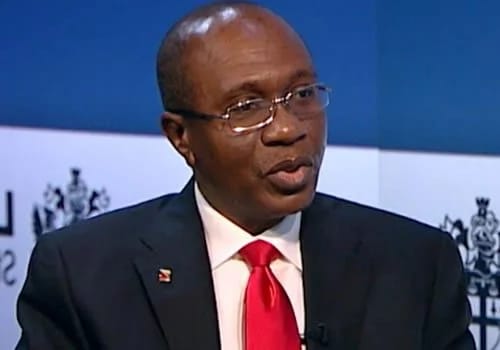The governor of the Central Bank of Nigeria (CBN), Godwin Emiefiele, yesterday revealed that the external reserves of Nigeria rose to $31.89 billion as at July 7, 2015.

Emiefiele made the disclosure while briefing the leadership of the Nigerian senate on the Nigerian economy in Abuja.
According to Thisday, Emiefiele attributed the recent improvement of the reserves to strong efforts of President Muhammadu Buhari to plug all leakages and the vigilant demand management of the central bank.
The CBN boss also said recent measures by the CBN would help reposition the Nigerian economy for the next phase of growth and development.
He listed the measures as; further tightening of monetary policy, closure of the official foreign exchange window, review of operators’ Net Open Position (NOP), placement of 72-hour limit on FX utilisation and ban on selected items from access to foreign exchange in either the interbank or BDC markets.
Emiefiele said, “These policies have led to a significant stabilisation in the exchange rate and an improvement in market sentiments. Having earlier traded at as high as N206/$1, the naira-dollar exchange rate has appreciated and remained around N197/$1 in the interbank market in the past five months.
“Going forward, the CBN would continue to be vigilant in the market to ensure that there is zero tolerance for speculators. Nigeria’s foreign reserves remain our common wealth and we must all strive to work together to protect it and prevent speculators and rent seekers from plundering it. We would continue to find ways to rebuild our external reserves and where possible, accelerate efforts aimed at improving aggregate supply potentials of the economy.
“Reflecting the sharp fall in oil prices and speculative foreign exchange activities, external reserves declined from $37.3 billion in June 2014 to $29.1 billion as at the end of June 2015. Given our understanding that the fall in oil prices may not be transitory but permanent, and that some speculative activities were going on in the forex market, the CBN took a number of proactive countervailing actions,” he explained.
He also said: “At the heart of the issues that currently confront our nation is the need for us to diversify the structure of our economy from being import dependent to being an economy that produces what she consumes. According to one of Africa’s foremost industrialist, our very own Alhaji Aliko Dangote, we must stop exporting jobs to other countries and importing poverty to our land by producing and consuming locally made goods.
“As we speak today, hundreds of thousands of locally produced paddy rice litter Nigeria’s rice belts unsold. Our rice farmers are today sinking deeper into poverty due to our preference for imported rice even though the local ones are now of about the same or even better quality. We therefore seize this opportunity to appeal to our rice importers to support local farmers by patronising our home grown rice.
“It is now time for us work together to resuscitate our moribund textile industries, begin to grow and consume our rice, and rejuvenate our abandoned palm plantations in the mid and south eastern parts of the country and a host of other industries that once helped in creating job opportunities for our people.”
He further revealed that the bank has been aacting as a catalyst to job creation and inclusive growth since 1978 through its various interventions in various/targeted sectors of the economy.
Two months ago, the United States of America Department of Agriculture, listed Nigeria as the only African country that would be among the top 20 economies in the world by 2030







